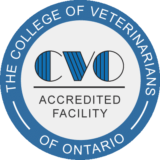Scoop on Poop
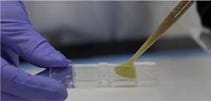
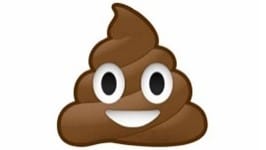 Upper Grand Veterinary Services is offering a new service; fecal testing done in house. For the month of May, we have a special promotion! Below is information on the importance of running fecal testing, methods of collection, and how the process of testing occurs – a little behind the scenes.
Upper Grand Veterinary Services is offering a new service; fecal testing done in house. For the month of May, we have a special promotion! Below is information on the importance of running fecal testing, methods of collection, and how the process of testing occurs – a little behind the scenes.
What happens once the feces has left your farm? You may have had a veterinarian collect a fecal sample and have them tell you that they are going to have fecal testing run at the lab. But what does that really mean? A technician is often examining the fecal samples under a microscope for the presence of parasites; often seen as eggs and/or cysts. These tests are run to prevent parasitic diseases in animals, and there are various tests that can be run.
With a mild burden of parasites, an animal may show no symptoms, however as the number of eggs increases you may notice symptoms. Fecal testing allows for us to assess parasitic burden in single or multiple animal(s). We can also assess if there is parasite resistance in animals that have been dewormed.
The first step in being able to run a fecal test is collecting the feces. Collection Method, though it may often be overlooked or thought of as not important, is extremely valuable for accurate results. When a sample is being collected from livestock there are two options; if you are concerned about one particular animal then ensuring you only get their feces is very important. However, if you are wanting to know how the herd’s parasitic burden is you can collect a pooled 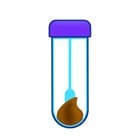 sample from a few different animals. When collecting from one single animal you can use a rectal sleeve or glove to collect a small sample (5- 10grams/little handful) of feces. Turn the rectal sleeve or glove inside out and tie in a knot to ensure feces does not end up on yourself or the ground. For collecting a pooled sample, it is best to put a few samples into a container so the samples get a degree of infection within the group. It is important to label the glove or container with your name – first and last, along with the animals’ ID or pen if a pooled sample. If the sample isn’t going to be brought into the clinic within 1 hour, please place the sample in a fridge to allow for the most accurate results.
sample from a few different animals. When collecting from one single animal you can use a rectal sleeve or glove to collect a small sample (5- 10grams/little handful) of feces. Turn the rectal sleeve or glove inside out and tie in a knot to ensure feces does not end up on yourself or the ground. For collecting a pooled sample, it is best to put a few samples into a container so the samples get a degree of infection within the group. It is important to label the glove or container with your name – first and last, along with the animals’ ID or pen if a pooled sample. If the sample isn’t going to be brought into the clinic within 1 hour, please place the sample in a fridge to allow for the most accurate results.
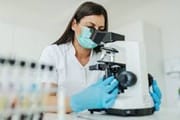 Once the sample reaches the clinic it is placed in the fridge until our registered veterinary technician, Pam Kitching, can run the sample in house. Ideally, the sample is run the same day it was received and there are different tests that can be performed. If looking for the presence of a parasite but not worried about how much of a burden, then you can do a Direct Smear Evaluation or Wet Mount. This is when you take a small sample of the feces and mix it with a little sterile water on a microscope slide, this slide is then viewed under the microscope and will tell you if there are parasites present but not the amount. The most common fecal testing for large animals is Fecal Flotation or McMaster’s Fecal Testing. Fecal floatation is
Once the sample reaches the clinic it is placed in the fridge until our registered veterinary technician, Pam Kitching, can run the sample in house. Ideally, the sample is run the same day it was received and there are different tests that can be performed. If looking for the presence of a parasite but not worried about how much of a burden, then you can do a Direct Smear Evaluation or Wet Mount. This is when you take a small sample of the feces and mix it with a little sterile water on a microscope slide, this slide is then viewed under the microscope and will tell you if there are parasites present but not the amount. The most common fecal testing for large animals is Fecal Flotation or McMaster’s Fecal Testing. Fecal floatation is  when 2-5grams of feces is mixed with a solution until the feces are broken up. The solution is then put through a metal strainer to take away any larger pieces. Once through the strainer, the solution is put into a plastic vial and filled so that a cover slip can sit on top for 10 – 20 minutes, after the time has passed the slide is viewed under a microscope and a fecal count of the level of parasites along with the identification of parasite can be completed. McMaster’s fecal testing is very similar to fecal floatation however a chamber device is used to allow for a faster count and the fecal solution sits in the chamber for 10 minutes instead of a vial.
when 2-5grams of feces is mixed with a solution until the feces are broken up. The solution is then put through a metal strainer to take away any larger pieces. Once through the strainer, the solution is put into a plastic vial and filled so that a cover slip can sit on top for 10 – 20 minutes, after the time has passed the slide is viewed under a microscope and a fecal count of the level of parasites along with the identification of parasite can be completed. McMaster’s fecal testing is very similar to fecal floatation however a chamber device is used to allow for a faster count and the fecal solution sits in the chamber for 10 minutes instead of a vial.
For the month of May, Upper Grand Veterinary Services is offering free fecal testing, all you have to do is drop the sample off at our Guelph location or give a sample to one of our vets for them to bring back to the office. After the sample has been tested you will be contacted with the results and next steps.
If you have any questions on these or other topics, please do not hesitate to contact one of our Veterinarians.



